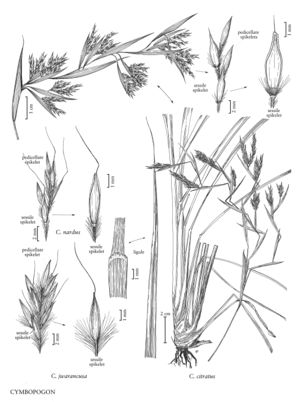Difference between revisions of "Cymbopogon nardus"
FNA>Volume Importer |
imported>Volume Importer |
||
| (5 intermediate revisions by 2 users not shown) | |||
| Line 26: | Line 26: | ||
-->{{#Taxon: | -->{{#Taxon: | ||
name=Cymbopogon nardus | name=Cymbopogon nardus | ||
| − | |||
|authority=(L.) Rendle | |authority=(L.) Rendle | ||
|rank=species | |rank=species | ||
| Line 33: | Line 32: | ||
|basionyms= | |basionyms= | ||
|family=Poaceae | |family=Poaceae | ||
| + | |illustrator=Linda A. Vorobik;Hana Pazdírková | ||
| + | |illustration copyright=Utah State University | ||
|distribution=Puerto Rico;Virgin Islands | |distribution=Puerto Rico;Virgin Islands | ||
|reference=None | |reference=None | ||
| Line 38: | Line 39: | ||
|publication year= | |publication year= | ||
|special status= | |special status= | ||
| − | |source xml=https:// | + | |source xml=https://bitbucket.org/aafc-mbb/fna-data-curation/src/200273ad09963decb8fc72550212de541d86569d/coarse_grained_fna_xml/V25/V25_1602.xml |
|subfamily=Poaceae subfam. Panicoideae | |subfamily=Poaceae subfam. Panicoideae | ||
|tribe=Poaceae tribe Andropogoneae | |tribe=Poaceae tribe Andropogoneae | ||
Latest revision as of 17:57, 11 May 2021
Plants perennial. Culms to 250 cm; nodes often swollen. Basal sheaths glabrous, smooth, purplish-red; ligules 3-6 mm, acute; blades to 100 cm long, 3-16 mm wide, surfaces smooth or scabrous. Inflorescences to 100 cm, linear, interrupted; rames 10-17 mm; internodes and pedicels pilose on the margins, glabrous dorsally. Sessile spikelets of heterogamous pairs 3-4.5(6) mm; lower glumes with narrowly winged keels; upper lemmas unawned or awned, awns 6-10 mm. 2n = 20, 40, 60.
Distribution
Puerto Rico, Virgin Islands
Discussion
Cymbopogon nardus has been cultivated in the United States, but the variety involved is not known. Cymbopogon nardus (L.) Rendle var. nardus, which is native to Sri Lanka, is the common citronella grass. It differs from C. nardus var. confertiflorus (Steud.) Stapf ex Bor, which is native to both Indian and Sri Lanka, in having unawned spikelets and 2n = 20, rather than awned spikelets and 2n = 40, 60. Both varieties have been widely introduced beyond their native range.
Selected References
None.
